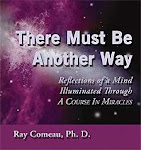And then these words and sentences came into my mind, and I grabbed my notebook and scribbled them down.
* * *
Awareness
I am seeing either through the body’s eyes, or through the eyes of Christ.
The Holy Spirit is the bridge.
Forgiveness
Receptivity
God’s Voice speaks to me all through the day. Lesson 49
Since I am in the world, and not of the world, how do I conduct myself while I am walking in the world?
Help
Intention
Gratitude
* * *
Then it came to me that Lesson 325 provided a perfect context for expressing this transformative distillation.
The question is always, just where is my awareness. This Lesson makes it clear right away, that my salvation is my awareness of the source of my ideas.
All things I think I see reflect ideas. Lesson 325
This is salvation's keynote: What I see
reflects a process in my mind, which starts
with my idea of what I want.
I am seeing either through the body’s eyes. . .and now the Lesson makes it clear the process I engage in when I am seeing through the body’s eyes and brain.
From there,
the mind makes up an image of the thing
the mind desires, judges valuable,
and therefore seeks to find. These images
are then projected outward, looked upon,
esteemed as real and guarded as one's own.
From insane wishes comes an insane world.
From judgment comes a world condemned.
What I am seeing through the body’s eyes is a projection of what is in my mind, first; I am, literally, “throwing” out of my mind images, and then I “catch” them, thinking they are in the world, first. Not only are they second, but I initially judged the image, choosing this one over that one. Not recognizing the source of the image in my mind is insanity.
. . .or through the eyes of Christ.
And from
forgiving thoughts a gentle world comes forth,
with mercy for the holy Son of God,
to offer him a kindly home where he
can rest a while before he journeys on,
and help his brothers walk ahead with him,
and find the way to Heaven and to God.
When I am aware that I am seeing my insane projections, I ask for help, asking the Holy Spirit to bridge the gap between my world and the Real world.
With His strength, I am able to forgive, to relinquish, my insane thoughts that have no source in reality, and my dream vanishes, to be replaced by seeing through the eyes of Christ. This is a reflection of the peace of mind I am now experiencing.
Our Father, Your ideas reflect the truth,
and mine apart from Yours but make up dreams.
Let me behold what only Yours reflect,
for Yours and Yours alone establish truth.
And now in this peaceful state, I am receptive to the Holy Spirit, the Voice for God, speaking to me all through the day.
For me, this is absolute key. When I manage to remember to ask for help to step back and be aware of God’s Voice, I trust that I will receive His Thoughts.
Since I am in the world, and not of the world, how do I conduct myself while I am walking in the world?
The root meaning of conduct is crucial here. It comes from the Latin con, “with” and ducere, “to lead.” I am being led through the world by listening to the Voice of the Holy Spirit.
And now I know what my intention is. Intention comes from the Latin intendere, meaning “ to stretch towards.” I ask for help in a peaceful, receptive state of mind, stretching upwards to receive guidance coming down from the Holy Spirit.
And now I experience gratitude, a warmth in my chest, and I am exceedingly receptive to the Holy Spirit's intention.
And that is exactly what happened a little while ago when I began receiving thoughts about this distillate and grabbed my notebook and began scribbling down these thoughts coming into my mind.
And now that my intention is realized and honored, taking this particular form, I can stop writing, right now.
